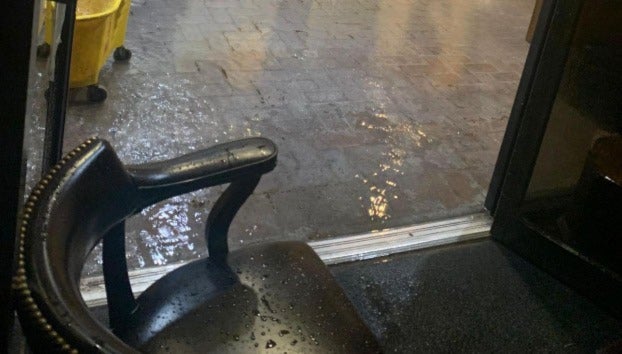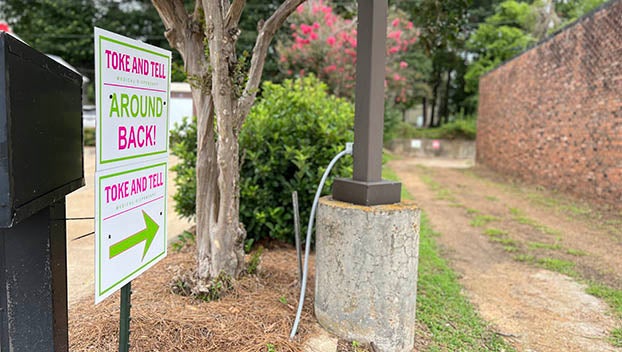Natchezians study ballot initiatives
Published 12:05 am Sunday, October 30, 2011
NATCHEZ — Voters in the Mississippi Nov. 8 General Election will be picking more than people; they will also express their opinions on what could become new state laws.
Three initiatives earned placement on the ballot after citizen-led petition drives met the necessary requirements.
A minimum of 89,285 certified signatures were necessary for the initiatives to make it onto the ballot.
For the initiatives to become amendments to the state constitution, they must receive the majority of the vote and more than 40 percent of the votes cast in that election.
Voters will vote “yes” or “no” on each initiative.
Initiative 26 — personhood
The personhood amendment, initiative 26, defines the term “person” as every human being from the moment of fertilization, cloning or the equivalent thereof.
Ruth Powers, a Natchez resident, said people are often surprised to learn that the Catholic voting block is not necessarily throwing its weight behind the personhood amendment.
Powers said the Catholic Diocese of Jackson explains that the passage of the amendment still would have no sway to overturn Roe v. Wade — the case that made abortion legal and available across the U.S.
A statement released by the diocese communication office said if such an amendment were to pass, a federal district court would likely strike it down based on Roe.
“This decision would undoubtedly be affirmed by an appellate court, and the case would either not be granted further review by today’s U.S. Supreme Court, or worse, lead to a reaffirmation of Roe,” the statement said. “The unintended effect would very likely jeopardize current protections in state law and cause a loss of momentum in the ultimate goal of establishing full legal protection of the unborn from the moment of conception.”
Powers said it is a position that many Mississippi Catholics are taking.
“(The amendment) is so broadly worded, there’s not a snowball’s chance it would stand up in a court challenge,” Powers said. “I fear if it goes to court at this point, coming out of the states, it may harm preempting efforts of pro-life groups — causing more harm than good.”
Powers said for the personhood amendment to have a chance in court, it must be more specific in its wording.
“The initiative is well intentioned,” Powers said. “It would be wonderful if we could get to the point where we believe it’s a human being from its earliest stages.”
Natchez resident Mary Jane Gaudet said while she considers herself a pro-life person, she thinks the amendment is more of a political statement than anything.
“I believe life starts with conception, but I will let doctors define those issues,” Gaudet said. “I am more for seeing that we develop support systems for people who bring children into world, than self righteously saying, ‘This is wrong.’”
Gaudet said perhaps society should look within itself and see if pro-life values are reflected.
“Pro-life means standing up for the working class,” Gaudet said. “Not sending men off to war. And capital punishment is as much a form of anti-life as abortion. I think the amendment is superfluous.”
Gillis Bland, chairman of deacons at Morgantown Baptist Church in Natchez, posted a “vote yes on amendment 26” sign in the churchyard. Gillis said he, and most church members, believe the Bible is clear about when life begins.
“When Mary went to meet Elizabeth, she was just less than a week pregnant with our Lord and Savior,” Bland said. “John (the Baptist) leaped in his mother’s womb when Mary came up, because she was carrying Jesus.”
Bland said folks on both sides of the issue need to take a closer look at the initiative.
“The amendment is not about abortion or women’s rights,” Bland said. “All it’s trying to say that life begins at conception.”
Initiative 27 — voter identification
Initiative 27, says a person should be required to submit a government-issued photo identification to vote.
Proponents of requiring identification at the polls say it can prevent voter fraud, which has been investigated in recent years in Southwest Mississippi.
Opponents say requiring an ID resembles a poll tax, since those who do not have to have an ID may have to pay to get the documentation required to obtain one.
Frances Bailey, chairman of the Adams County Democratic Party, said she does not fully embrace the voter ID initiative. She said it would slow the election process at the polls, especially during a general election.
But Bailey said her bigger concern is for the elderly who may not be able to get to the DMV for an ID.
“Telling them to go to the DMV will put people on the spot,” Bailey said. “I’ve heard quite a few people talking about that.”
Stratton Bull, an attorney who recently relocated back to Natchez, said while it doesn’t bother him to show identification at the polls, he can see how some people would opt not to vote if they had to obtain identification.
“There are lots people who might have a difficult time getting valid identification.” Bull said.
But local Realtor Sue Stedman pointed out that when her husband turned 65 this year, he had to present at least two documents proving who he was to receive Medicare benefits.
“I don’t think the process (of showing ID) is keeping too many people from signing up for Medicare,” Stedman said.
Stedman said the amendment really comes down to honoring the process.
“It’s about keeping elections honest,” Stedman said. “You show ID to cash a check and get on a plane — what’s wrong with showing an ID to vote?”
The Department of Public Safety is estimated to see a loss of revenue of approximately $1,499,000 to supply IDs to voters.
Initiative 31 — eminent domain
Initiative 31, if passed, would amend the Mississippi Constitution to prohibit state and local government from taking private property by eminent domain and giving it to private individuals.
Exceptions listed in the initiative from the prohibition include drainage and levee facilities, roads, bridges, ports, airports, common carriers and utilities. The prohibition would not apply in certain situations, including public nuisance, structures unfit for human habitation or abandoned property.
Natchez attorney Johnny Junkin said he supports limiting the government’s power to obtain land through eminent domain. However, he said key considerations in this initiative were left out.
Junkin said one of the problems with the initiative is that it does not account for land owners who own surface rights to their land but not mineral rights.”
Junkin said the initiative needs to be cleaned up.
“I think you could end up with some unintended consequences,” he said.
Leland Speed, executive director of the Mississippi Development Authority, said clear land titles and clear mineral rights are essential for developers.
“Nobody who is going to build wants some fellow to show up and say, ‘I own your mineral rights, and I want to drill an oil well right in the middle of your operation,” he said.
Speed said eminent domain has been used five times in the last 22 years, and only once in the past eight years for the Nissan plant near Tupelo.
“And when the property owner objected then, they prevailed in court,” he said
Speed said if the initiative passes, the potential job losses in Mississippi will be serious.
“We’re talking about thousand of jobs,” he said. “We’re not talking about hundreds of jobs, we’re talking about thousands.”
Speed said passing the initiative would mean Mississippi would be unnecessarily shooting itself in the foot when it comes to major development.
“We have a chance,” Speed said. “We are competitive. We are a player in this game.”
Speed said the initiative is an answer looking for a problem.
“The price we’re talking about paying is dramatic to solve a problem that just doesn’t exist.”
Natchez Inc. Executive Director Chandler Russ said he believes in private property rights and does not like eminent domain.
Russ said he is unaware of a single instance where the right to eminent domain has been abused in Mississippi.
“Because not a single instance exists,” he said.
Russ said he opposes Initiative 31 because he believes it is bad public policy, will do irreparable harm to Mississippi and because more reasonable alternatives exist.
“If Initiative 31 is passed, it will send a loud and clear message to the corporate boardrooms of America and across the world in this global economy we now live in, that Mississippi is closed for business,” he said.
Russ said the initiative is not about preserving private property. He said the initiative does not stop the taking of private property.
“Two votes of the highway commission can still take your property for MDOT’s purposes,” he said. “Three votes of any board of supervisors can still take your property. A majority of any municipal board can take your property.”
Local resident Faye Kolb said she is against the initiative. She said she believes Mississippi needs all the jobs it can get.
Kolb said she believes landowners should be fairly compensated, and eminent domain should be used only when it’s bringing industry and jobs.
“I’m not for it being used to build condominiums or something like that,” she said.
Adams County Board of Supervisors President Darryl Grennell said he is in favor of Initiative 31.
Grennell said in his personal opinion he does not believe the government should take property from an owner for the benefit of a private individual or company.
Grennell said if the government uses eminent domain, it should be for public use.
“It should be for road, bridges and other public purposes, not for a private person to benefit,” he said.
Grennell said he supports the initiative even in cases of industry development.
“Yes it benefits the community as a whole, but I think it’s something that should be worked out with the private property owner and not taken through eminent domain purposes,” he said.
Quanita Dixon said she’ll be voting for the initiative when she goes to the polls. Dixon said property owners have a right to their land, and ownership should stay in the community.
“You’re taking land from people and giving it to a corporation,” she said.
Dixon said government has control over too much.
“They have control over everything as it is,” she said. “Why continue to give them that?”
George Davis Collins is also voting for Initiative 31.
“If somebody’s worked and got something, why would they take it and give it to someone else?”
Collins said he doesn’t believe landowners are fairly compensated when the government seizes land.
“They give you what they want to give you,” he said.
Nicole Zema contributed to this report.





